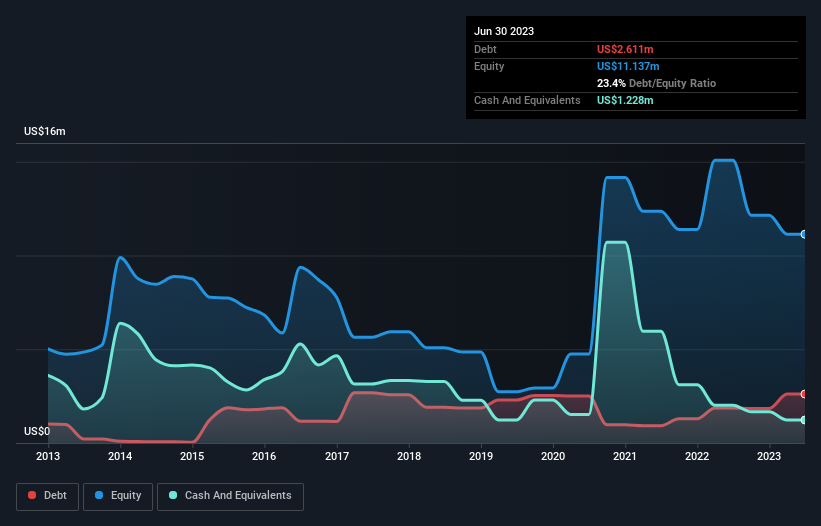Legendary fund manager Li Lu (who Charlie Munger backed) once said, 'The biggest investment risk is not the volatility of prices, but whether you will suffer a permanent loss of capital.' So it might be obvious that you need to consider debt, when you think about how risky any given stock is, because too much debt can sink a company. Importantly, RoboGroup T.E.K. Ltd. (TLV:ROBO) does carry debt. But should shareholders be worried about its use of debt?
What Risk Does Debt Bring?
Debt and other liabilities become risky for a business when it cannot easily fulfill those obligations, either with free cash flow or by raising capital at an attractive price. In the worst case scenario, a company can go bankrupt if it cannot pay its creditors. While that is not too common, we often do see indebted companies permanently diluting shareholders because lenders force them to raise capital at a distressed price. By replacing dilution, though, debt can be an extremely good tool for businesses that need capital to invest in growth at high rates of return. When we examine debt levels, we first consider both cash and debt levels, together.
See our latest analysis for RoboGroup T.E.K
What Is RoboGroup T.E.K's Debt?
The image below, which you can click on for greater detail, shows that at June 2023 RoboGroup T.E.K had debt of US$2.61m, up from US$1.87m in one year. However, because it has a cash reserve of US$1.23m, its net debt is less, at about US$1.38m.

How Strong Is RoboGroup T.E.K's Balance Sheet?
According to the last reported balance sheet, RoboGroup T.E.K had liabilities of US$7.47m due within 12 months, and liabilities of US$5.15m due beyond 12 months. Offsetting this, it had US$1.23m in cash and US$4.96m in receivables that were due within 12 months. So its liabilities total US$6.42m more than the combination of its cash and short-term receivables.
This deficit is considerable relative to its market capitalization of US$9.55m, so it does suggest shareholders should keep an eye on RoboGroup T.E.K's use of debt. Should its lenders demand that it shore up the balance sheet, shareholders would likely face severe dilution. When analysing debt levels, the balance sheet is the obvious place to start. But you can't view debt in total isolation; since RoboGroup T.E.K will need earnings to service that debt. So when considering debt, it's definitely worth looking at the earnings trend. Click here for an interactive snapshot.
Over 12 months, RoboGroup T.E.K made a loss at the EBIT level, and saw its revenue drop to US$13m, which is a fall of 32%. To be frank that doesn't bode well.
Caveat Emptor
Not only did RoboGroup T.E.K's revenue slip over the last twelve months, but it also produced negative earnings before interest and tax (EBIT). Indeed, it lost a very considerable US$3.8m at the EBIT level. Considering that alongside the liabilities mentioned above does not give us much confidence that company should be using so much debt. Quite frankly we think the balance sheet is far from match-fit, although it could be improved with time. However, it doesn't help that it burned through US$1.0m of cash over the last year. So suffice it to say we consider the stock very risky. The balance sheet is clearly the area to focus on when you are analysing debt. However, not all investment risk resides within the balance sheet - far from it. To that end, you should be aware of the 4 warning signs we've spotted with RoboGroup T.E.K .
When all is said and done, sometimes its easier to focus on companies that don't even need debt. Readers can access a list of growth stocks with zero net debt 100% free, right now.
New: AI Stock Screener & Alerts
Our new AI Stock Screener scans the market every day to uncover opportunities.
• Dividend Powerhouses (3%+ Yield)
• Undervalued Small Caps with Insider Buying
• High growth Tech and AI Companies
Or build your own from over 50 metrics.
Have feedback on this article? Concerned about the content? Get in touch with us directly. Alternatively, email editorial-team (at) simplywallst.com.
This article by Simply Wall St is general in nature. We provide commentary based on historical data and analyst forecasts only using an unbiased methodology and our articles are not intended to be financial advice. It does not constitute a recommendation to buy or sell any stock, and does not take account of your objectives, or your financial situation. We aim to bring you long-term focused analysis driven by fundamental data. Note that our analysis may not factor in the latest price-sensitive company announcements or qualitative material. Simply Wall St has no position in any stocks mentioned.
About TASE:ROBO
RoboGroup T.E.K
Engages in the robotics, motion control, and technology education business in Israel.
Mediocre balance sheet with low risk.
Market Insights
Community Narratives



